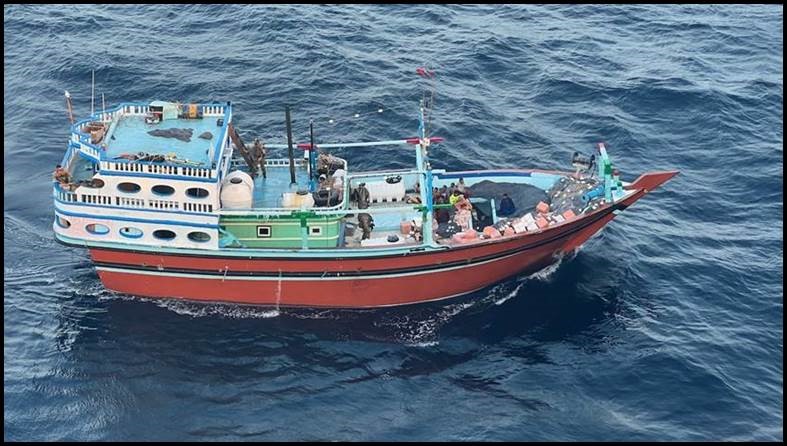- The US Navy SEALs executed a complex boarding of a dhow near the coast of Somalia in the international waters of the Arabian Sea, seizing Iranian-made ballistic missile and cruise missile components.
- The seized items included propulsion, guidance, and warheads for the Yemen-based terror group Houthi medium-range ballistic missiles and anti-ship cruise missiles.
- During the operation, however, one Navy SEAL fell into the rough waters off Somalia’s coast, and a second SEAL followed, attempting to rescue him in vain.
The US Navy has declared two SEALs, who went missing off the coast of Somalia 11 days ago, dead following a futile search and rescue mission.
The two Navy SEALs were reported missing after a risky mission involving the boarding of a vessel loaded with missile assembly materials in operation on the night of January 11 off the coast of Somalia, as stated by the United States Central Command in an update on X.
During the nighttime operation, one Navy SEAL fell into the rough waters off Somalia’s coast, and a second SEAL followed, attempting to rescue him in vain.
“We regret to announce that after a 10-day exhaustive search, our two missing US Navy SEALs have not been located and their status has been changed to deceased,” Central Command said in a statement on Sunday. “Out of respect for the families, no further information will be released at this time.”
The US Navy SEALs complex mission boarding a weapon-laden dhow
The US CENTCOM noted that a joint rescue operation, carried out by teams from the United States, Spain, and Japan, searched more than 21,000 square miles of the ocean for the missing SEALs in vain.
CENTCOM Commander General Michael Erik Kurilla said, “We mourn the loss of our two Naval Special Warfare warriors, and we will forever honor their sacrifice and example. Our prayers are with the SEALs’ families, friends, the US Navy, and the entire Special Operations community during this time.”
On January 11th, CENTCOM announced that US Navy SEALs executed a complex boarding of the dhow near the coast of Somalia in the international waters of the Arabian Sea, seizing Iranian-made ballistic missile and cruise missile components.
The seized items included propulsion, guidance, and warheads for the Yemen-based terror group Houthi medium-range ballistic missiles and anti-ship cruise missiles, as well as air defense-associated components.
According to the US, the initial analysis of the seized items indicated that the Houthis had employed these same weapons to threaten and attack innocent mariners on international merchant ships transiting in the Red Sea.
“This is the first seizure of lethal, Iranian-supplied advanced conventional weapons (ACW) to the Houthis since the beginning of Houthi attacks against merchant ships in November 2023,” CENTCOM noted.
“It is clear that Iran continues shipment of advanced lethal aid to the Houthis. This is yet another example of how Iran actively sows instability throughout the region in direct violation of U.N Security Resolution 2216 and International law,” said General Michael Erik Kurilla.
Since October 2023, Iranian-backed Houthi militants have been attacking and harassing over 30 ships in international shipping lanes.
Read also: Costly voyages: Will EAC shoulder the burden of Houthi rebels in the Red Sea?
Risk of attacks by Houthi rebels
These illegal incidents include attacks employing anti-ship ballistic missiles, unmanned aerial vehicles, and cruise missiles in the Red Sea and the Gulf of Aden.
The sustained attacks and the increasing risk of attacks by Houthi terrorists on commercial shipping lines are compelling mariners to cease business operations.
Some companies, like oil giant BP and MAERSK, opt for longer trade routes around Africa to deliver critical goods to key European markets.
Electric vehicle maker Tesla has already announced the shutdown of its factory in Germany until February 11, citing delays in the shipment of key components.
Vast volumes of oil, natural gas, grains, and other finished products, accounting for 12 per cent of global trade, typically pass through the Red Sea, the waterway between Africa and the Arabian Peninsula.
According to Freightos Group, an estimated 30 per cent of global container traffic passes through the Red Sea’s Suez Canal, implying that attacks on mariners have the consequences of throttling many businesses internationally.
The AP reports that 90 per cent of the container ships going through the Suez Canal are now rerouting around the Cape of Good Hope in South Africa.
Simultaneously, the cost to ship a standard 40-foot container from China to northern Europe has surged from $1,500 to $4,000, as stated by the Kiel Institute for the World Economy in Germany, according to AP.
To counter the Houthis, the US is leading a coalition of nations, including the United Kingdom, Bahrain, Canada, France, Italy, the Netherlands, Norway, Seychelles, and Spain, in a security initiative to protect ships in the Red Sea.
Further, the US maintains a military presence around Somalia, primarily tasked with countering threats from the terrorist organization Al Shabaab, which has been a significant challenge for the Somali government.
